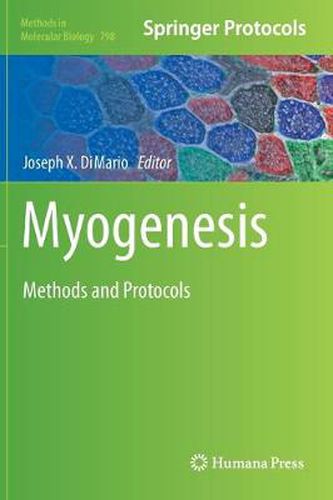Readings Newsletter
Become a Readings Member to make your shopping experience even easier.
Sign in or sign up for free!
You’re not far away from qualifying for FREE standard shipping within Australia
You’ve qualified for FREE standard shipping within Australia
The cart is loading…






This title is printed to order. This book may have been self-published. If so, we cannot guarantee the quality of the content. In the main most books will have gone through the editing process however some may not. We therefore suggest that you be aware of this before ordering this book. If in doubt check either the author or publisher’s details as we are unable to accept any returns unless they are faulty. Please contact us if you have any questions.
Our understanding of the molecular and cellular mechanisms that control skeletal muscle development, regeneration, and adaptive responses to activity has increased dramatically in recent years, fostered by innovative techniques and approaches that are either specifically designed or adapted for research in skeletal muscle biology. Myogenesis: Methods and Protocols presents detailed, step-by-step methods in the study of the molecular and cellular biology of skeletal muscle cells. Protocols from different model systems including mammalian, avian, zebrafish, and invertebrate skeletal muscle are included in this volume. Highlighted topics cover a wide range of interests and expertise including myogenic and stem cell isolation, investigation of models of exercise and disuse, viral vector delivery systems, calcium imaging, cell profiling, as well as protein-DNA and protein-protein interactions. Written in the highly successful Methods in Molecular Biology ™ series format, chapters include introductions to their respective topics, lists of the necessary materials and reagents, readily reproducible laboratory protocols, and tips on troubleshooting and avoiding known pitfalls.
Comprehensive and authoritative, Myogenesis: Methods and Protocols serves as an invaluable, state-of-the-art resource for experienced and emerging scientists in basic research as well as clinical and regenerative medicine.
$9.00 standard shipping within Australia
FREE standard shipping within Australia for orders over $100.00
Express & International shipping calculated at checkout
This title is printed to order. This book may have been self-published. If so, we cannot guarantee the quality of the content. In the main most books will have gone through the editing process however some may not. We therefore suggest that you be aware of this before ordering this book. If in doubt check either the author or publisher’s details as we are unable to accept any returns unless they are faulty. Please contact us if you have any questions.
Our understanding of the molecular and cellular mechanisms that control skeletal muscle development, regeneration, and adaptive responses to activity has increased dramatically in recent years, fostered by innovative techniques and approaches that are either specifically designed or adapted for research in skeletal muscle biology. Myogenesis: Methods and Protocols presents detailed, step-by-step methods in the study of the molecular and cellular biology of skeletal muscle cells. Protocols from different model systems including mammalian, avian, zebrafish, and invertebrate skeletal muscle are included in this volume. Highlighted topics cover a wide range of interests and expertise including myogenic and stem cell isolation, investigation of models of exercise and disuse, viral vector delivery systems, calcium imaging, cell profiling, as well as protein-DNA and protein-protein interactions. Written in the highly successful Methods in Molecular Biology ™ series format, chapters include introductions to their respective topics, lists of the necessary materials and reagents, readily reproducible laboratory protocols, and tips on troubleshooting and avoiding known pitfalls.
Comprehensive and authoritative, Myogenesis: Methods and Protocols serves as an invaluable, state-of-the-art resource for experienced and emerging scientists in basic research as well as clinical and regenerative medicine.